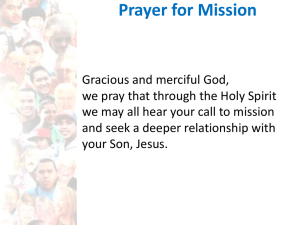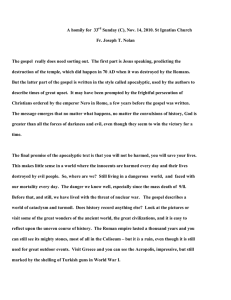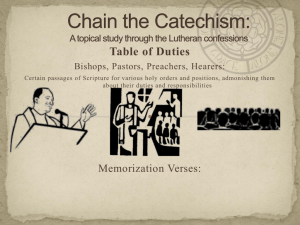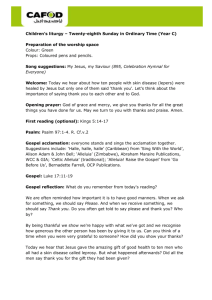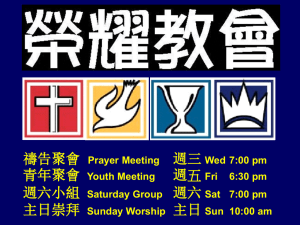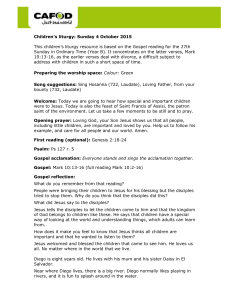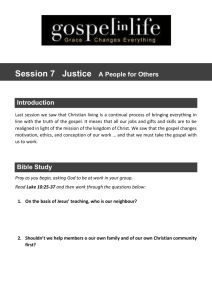The Forgotten Ways by Alan Hirsch
advertisement
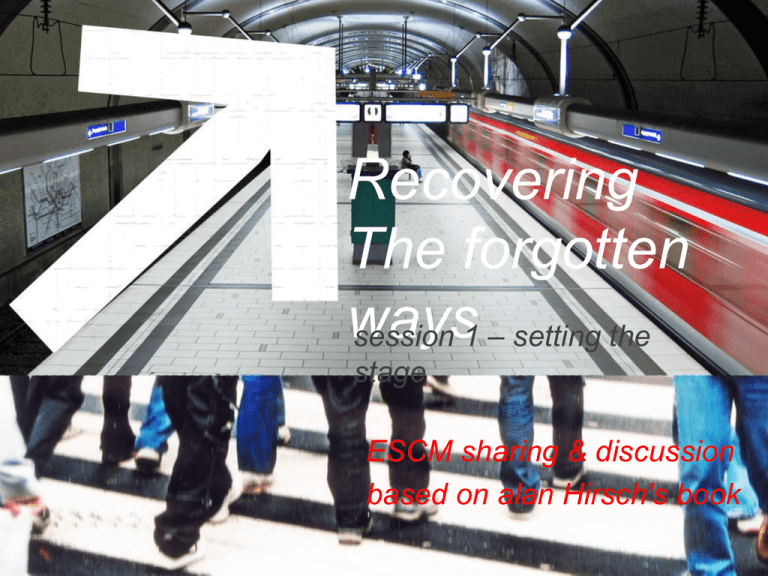
Recovering The forgotten ways session 1 – setting the stage ESCM sharing & discussion based on alan Hirsch's book distance from “church” to people • Missiologist Ralph Winter’s “cultural distance” Church culture m0 m1 m2 m3 m4 – m0-m1: same language, similar interest and social background, some understanding and openness to Christianity – m3-m4: highly resistant to church and Gospel, cannot understand the church language and culture – Originally applied to distance from the Gospel message only, but Hirsch recognized in post-Christendom there is now a significant cultural distance between church and the general population “church” is “too far” for most • In Australia current “church” has “market appeal” to only 12% of the population • Family values, decent living segment • In the United States, church “market appeal” is probably slightly higher, as evangelical attendance is 9% • Canada is probably closer to Australia, but regardless of exact data, majority of population (80%?) find church is too far from them culturally consumers vs participants • Jesus’ approach – Spoke in confusing riddles (parables) which evoked a spiritual search in the hearers – The hearers were activated in their spirits because they had to do the hard work of filling in the blanks • Today’s common church approach – Pulpit ministry – 5% active – Platform & Program ministry – 10% active – Highly participatory alternative service (dialogue, lounge feel, multisensory communication, pop art, etc.) – 20% active – Their attempt made things worse – consumer standard raised and couldn’t connect elsewhere if they leave – Majority still consumptive, came to “get fed” – “Consumption is detrimental to discipleship” rebuilding the church on true participation • From static, geographically located church to dynamic movement in the whole city • Reverse active to passive ratio – at least 80% participating • Fully reproducible system based on some internal DNA • Organic multiplication as a network, not centralized organization • Mission as the organizing principle of the movement, not ministry Doing church in the middle part don’t take my word for it “Practically, I’m toying with the idea of starting a network of gatherings that meet in homes in order to practice the commands of Scripture. They could watch sermons via DVD or have a leader give the lesson. They may even sing together. But the gatherings wouldn’t stop there. They would discuss how to live out the sermon in their neighborhood. They would also pray for each other. They would take communion and remind each other of the mission. They would meet the needs of the members of their group and their unsaved neighbors. Rather than coming to church, they would be the church—not in a sacred building, but in their neighborhoods. Occasionally, we could all gather in an auditorium or stadium to celebrate and worship collectively.” – Francis Chan, Cornerstone Simi Church key question for groups If we are to start a new church according to Jesus’ calling, name 3 to 5 things that are top priorities about how we should be doing church? answers a answers prayer culture (who is going to pray), romancing people into God (love for God and love for neighbor), redemptive- incarnation of God’s work (being Jesus there), less is more (make discicples), reaching out the neighbor – gospel in action (ex. Weekly appointment with the community), be there where the need is, acts 2:42-47 (you can read on your own), not human-focused, Godfocused (thanks ada and howard), authenticity, teaching in situation and modelling (heal first, preach second), preparation (where, what community, need, what will you do after the harvest), how Christ think and how we are like Him, more mission, less meetings (CHEERS!!! APPLAUSE!!!), spirituality (filled with the Holy Spirit, Francis Chan calls Him the Forgotten God, wait! That’s the title of his book), grow in the Spirit and sense His power, gathering believers in a lifestyle of worship (not just the Sunday thing, but 24/7, includes prayer, word, praising, loving and serving one another). “Martha syndrome” (respond to God instead of feel guilty we aren’t doing enough), understand our calling to make disciples, wasted energy & resources (or they protect the building like fort knox), model a comfort/security of christianity vs. taking up the cross, public, not private. mDNA pray Where do you want God to lead you in your church context in light of what you learned today, so that you will begin to capture the Mission of Jesus Christ again?



